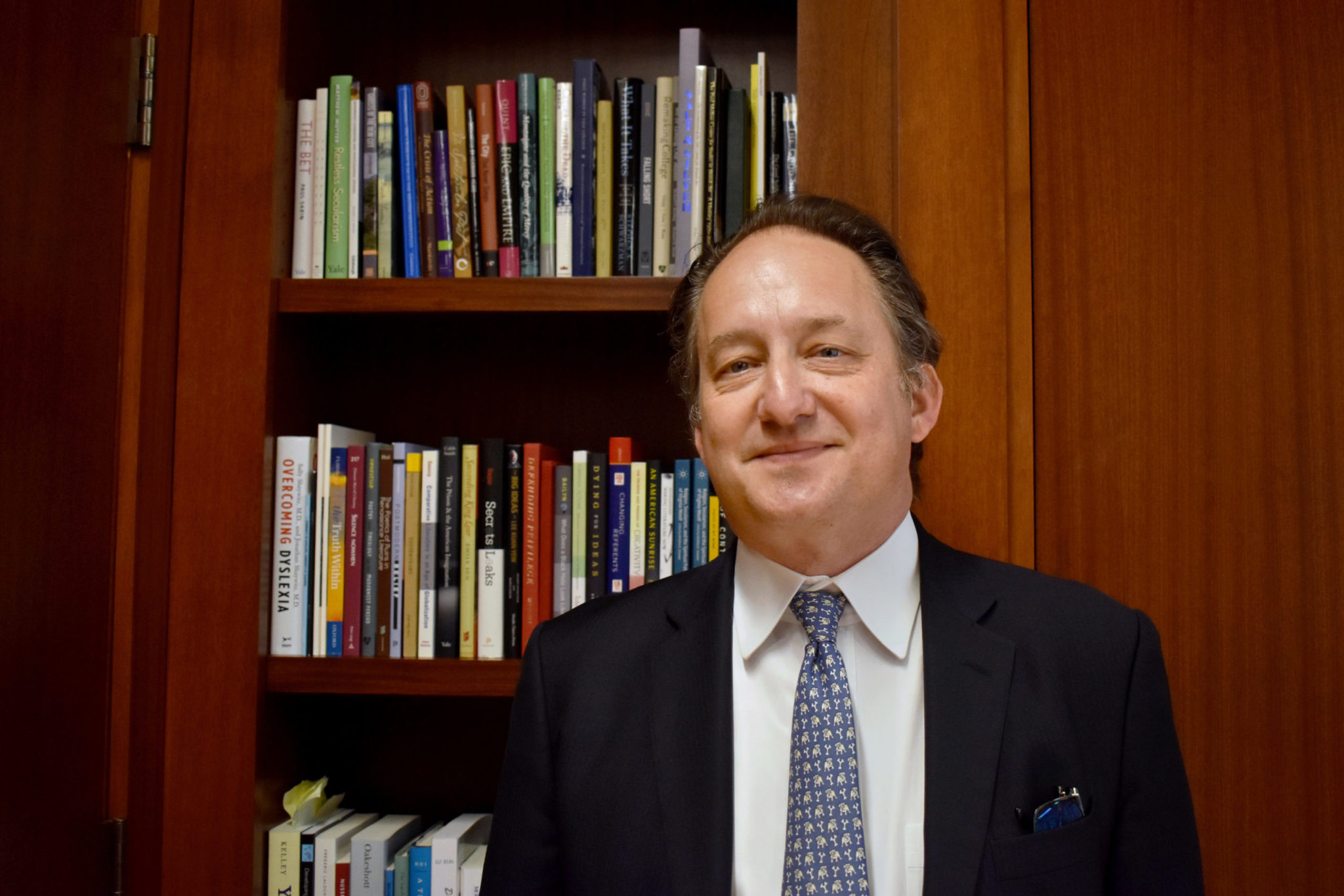Lewis outlines academic priorities as Yale College Dean
The newly-named Dean of Yale College said that his near-term strategic goals include streamlining registration and boosting advising resources.

Benjamin Hernandez, Contributing Photographer
Halfway into the fall semester, Pericles Lewis’ academic agenda for his term as dean of Yale College is taking shape.
Lewis, who was named dean in May, told the News he plans to reexamine Yale’s class registration and advising systems, as well as expanding programs for first-generation, low income students. The ultimate goal, he said, is to modernize the Yale College experience and provide clearer guidelines for students navigating various majors and paths.
“The Yale student has to make a lot of choices for themselves, and I hope we can help provide them the information and background and context for them to be able to make those choices,” Lewis told the News.
One priority, he said, is to consider continued reforms to the College’s class registration system — a cornerstone of outgoing Dean Marvin Chun’s legacy.
The new early registration system, which requires students to register for courses a semester in advance, was implemented for the first time during the pandemic after years of planning, alongside the scrapping of the archaic Online Course Selection system in favor of a streamlined Yale Course Search website.
The system is accompanied by an add/drop window at the beginning of each semester that is significantly shorter than the abolished shopping period. Students remain largely dissatisfied with the process, while faculty reported mixed feelings.
No class registration system is “perfect,” he said, but Lewis is hoping to minimize the system’s challenges for all parties.
“The earlier you have registration, the more information you have for assigning classrooms [and] teaching systems knowing where the demand is for courses,” Lewis said. “On the other hand, the later you have it, the more freedom students may have to change their mind.”
Lewis said potential options for improvement include the creation of two distinct rounds of preference selection, or lengthening the time given for certain decisions.
Beyond the registration system itself, Lewis says he hopes to provide a stronger network of advising and informational support to students, describing the current residential college advising system as a “strong feature” that helps first-year students adjust to academic and college life more broadly. He is also interested in finding ways to provide information earlier in August about course selection.
Many students previously told the News that the complex system of advising is often confusing and hard to navigate. Advisors often lack the information necessary to provide course recommendations or other academic opportunities, they said. Faculty, too, observed a general decline in the College’s advising relationships.
Lewis said he hopes to expand support systems for all students, including making programs for first-generation low income students “more effective and well-coordinated” and increase support for Eli Whitney and transfer students.
The dean also plans to more deeply examine existing pathways into various majors, the feasibility of completing certain majors alongside distribution requirements and how a student’s high school background impacts their ability to complete their major and distributional requirements.
Lewis said that he and Chun “share a very similar attitude to the importance of a liberal education as it has evolved.”
Unlike his predecessor, however, Lewis said he does not plan to make changes to the Credit/D/Fail system, which allows students up to six opportunities to convert classes from letter grades to Credit/D/Fail and underwent significant reforms under Chun.
“I want to just see how the current system works and not make any changes there,” Lewis told the News, “I do think that people put a lot of pressure on Credit/D/Fail, and although it’s important that we have that option, I think students spend too much time worrying about it, so I’d love to find a way to get people to not obsess so much.”
Prior to taking on the role of dean, Lewis served as an administrator in several capacities, including as the vice provost for global strategy and associate vice president of academic initiatives at Yale and as the founding president of Yale-NUS — the first liberal arts college in Singapore founded through Yale’s partnership with the National University of Singapore.
Senior Associate Dean of Strategic Initiatives and Communications Paul McKinley told the News that he is confident in Lewis’ abilities to serve as dean.
“Dean Lewis is beginning in this new role with decades of experience as one of Yale’s senior leaders,” McKinley wrote in an email to the News. “He is also a member of the faculty with a deep and broad understanding of the curriculum and is a leading figure who studies liberal education. He is in an excellent position to take up his new duties as dean.”
Senior Vice President of Operations Jack Callahan similarly expressed confidence in Lewis’ leadership of Yale College so far. He described Pericles as a “terrific leader in higher education” who is “very collaborative” and “very student focused.”
Lewis joined Yale in 2008.







